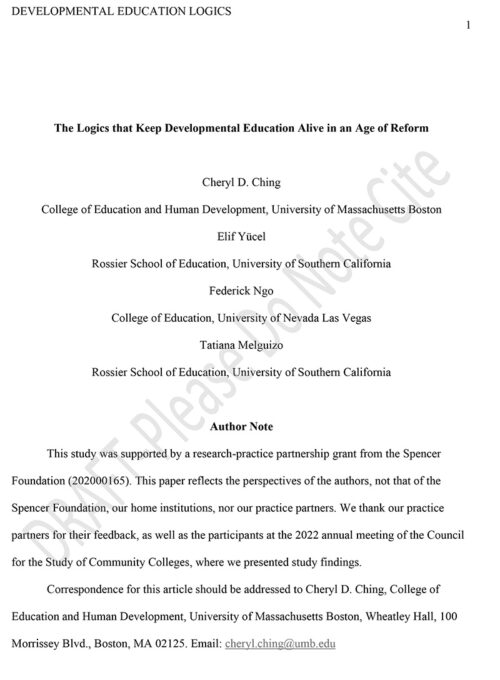
The Logics that Keep Developmental Education Alive in an Age of Reform – Working Paper
Cheryl D. Ching, Elif Yücel, Federick Ngo, Tatiana Melguizo (2022)
Developmental education (DE) reform is a national phenomenon. Across the country,
policymakers, reform networks, advocacy groups, philanthropic organizations, and others have
called for fundamental changes in how institutions of higher education prepare students for
college work (Jaggars & Bickerstaff, 2018). Community colleges are critical to this project
because of their outsized role in providing DE to recent high school graduates as well as adult
students (Bragg, 2001). Although DE approaches have differed over time (Arendale, 2011), in
the current era, DE is synonymous with “pre-requisite remediation.” Pre-requisite remediation is
the sequence of pre-college courses (also known as DE or below-transfer-level courses; we use
these terms interchangeably) into which colleges place students deemed “underprepared,” based
on an assessment of their reading, writing, and math ability.
Questions about the effectiveness, efficiency, and fairness of pre-requisite remediation
started in the early 2000s and has grown in subsequent years as researchers used large data sets
and causal statistical analyses to show that (a) the standardized assessment tests that most
colleges rely on for placement inaccurately measure students’ college readiness (e.g., Author,
2016); (b) measures such as high school GPA, grades, and coursetaking may better capture
student readiness (Bergman et al., 2018); (c) placement in DE stymies progression to college
coursework and completion (Valentine et al., 2017); and (d) current arrangements
disproportionately impact Black and Latinx/a/o students (Xu, 2016). Additionally, qualitative
studies cracked open the “black box” of the classroom and highlighted the prevalence of “basic
skills instruction” that foregrounds procedural knowledge and discrete skill development over
the critical thinking, conceptual complexity, and context-based learning generally expected in
higher education (Cox, 2015; Grubb & Gabriner, 2013).
Equity for Community College Students AB705 community college
| File | Action |
|---|---|
| Logics that Keep Dev Ed Alive for Pullias[4].pdf | Download |